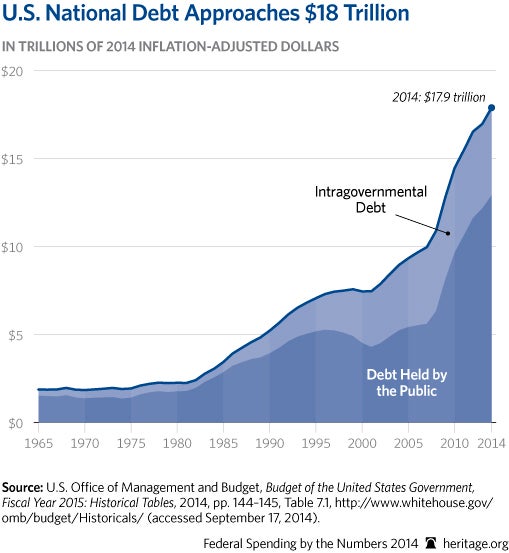Stephen Moore

Photo: Getty Images
When I first arrived in Washington in the early 1980s, the debt was roughly $2 trillion. This week, 30 years and five presidents later, the debt for the first time exceeded $18 trillion. We have been in the red in all but four of the last 40 years.
That’s $18,000,000,000,000. We all know that $18 million is a lot of money. This is $18 million times another million. The number is so gigantic we won’t or can’t try to fathom it.
Why worry? We owe it to ourselves, we’re told. The mighty American economy is big enough to absorb it. This country was built on debt. There is no better time to borrow than when interest rates are at a 40-year low.
There’s some truth in all these claims. Sure, we have a near–$18 trillion economy, but the problem is that the debt is outgrowing the economy. In just the last seven years — the last year of George W. Bush’s presidency and the first six of Obama’s — the debt has increased by roughly $7.4 trillion. That’s ten times the entire debt incurred in our first 200 years as a nation.

My view is that government debt isn’t inherently evil. The wisdom of borrowing depends on what you use the money for. We borrowed trillions (in today’s dollars) to win World War II. Surely that was worth it. We borrowed another $1.8 trillion during the Reagan years to finance winning the Cold War and rebuilding the private economy with growth-hormone tax cuts. That has clearly benefited future generations — so they should bear some of the cost.
But what we have bought with most of our debt of the last two decades has been a bigger, more expansive welfare state. Almost half of all American households, according to the Census Bureau, get a government check or some direct benefit from government today. More than one-third of households get some kind of unearned welfare.
Obama called his spend-and-borrow policies a “stimulus.” Really? What do we have to show for Obama’s debt? Solyndra. Forty-six million people on food stamps. The Obamacare debacle. Etc. Etc. This is one of only two times in American history (the post–Vietnam War era is the other) that we have opened up the flood gates on borrowing even as we have severely slashed the military budget.
Here is the biggest worry about an $18 trillion debt: What happens if/when interest rates start to drift back upward? Answer: This is the economic equivalent of the nuclear option.
Each 1-percentage-point rise in interest rates causes the U.S. deficit to rise by more than $1 trillion over ten years. So a 300-basis-point rise in rates — nothing more than a return to normalcy — would mean about $5 trillion in federal deficits.
If that happens, the debt-servicing costs grow astronomically and interest payments would become the biggest expense item in the budget. We start to pay more and more taxes just to finance past borrowing. This is what happened in Detroit; look at how that turned out.
Maybe this debt bubble won’t burst. Let’s pray that it doesn’t. If it does, the 2008–09 real-estate crash could look like a picnic by comparison.
The politicians think they are pulling a fast one here, but the vast majority of Americans feel in their gut that the economy is headed in the wrong direction, in no small part because of this debt time bomb. It explains why Barack Obama’s policies were so thoroughly routed during November’s midterm elections. A great nation doesn’t ring up unpaid bills month after month, year after year, decade after decade. The basic common sense of Americans tells us that you don’t borrow your way to prosperity.
Oh, and we’re still borrowing half a trillion a year, so the debt will likely hit $20 trillion sometime before 2018. Have a nice day.
No comments:
Post a Comment